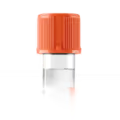Do I need a Vitamin C test?
Feeling run down, bruising easily, or noticing your wounds heal slower than usual? Could low vitamin C be affecting your immune system and recovery?
Vitamin C is essential for immune function, collagen production, and tissue repair. When levels drop, you may experience fatigue, weakened immunity, and poor wound healing.
Testing your vitamin C gives you a quick snapshot of your antioxidant status and helps explain why you might be feeling worn down or healing slowly. It's the first step to personalizing your nutrition plan and strengthening your body's natural defenses.
Method: Laboratory-developed test (LDT) validated under CLIA; not cleared or approved by the FDA. Results are interpreted by clinicians in context and are not a stand-alone diagnosis.

A derived biomarker is a value that is calculated from other directly measured biomarkers rather than being measured directly in the lab.
Get tested with Superpower
If you’ve been postponing blood testing for years or feel frustrated by doctor appointments and limited lab panels, you are not alone. Standard healthcare is often reactive, focusing on testing only after symptoms appear or leaving patients in the dark.
Superpower flips that approach. We give you full insight into your body with over 100 biomarkers, personalized action plans, long-term tracking, and answers to your questions, so you can stay ahead of any health issues.
With physician-reviewed results, CLIA-certified labs, and the option for at-home blood draws, Superpower is designed for people who want clarity, convenience, and real accountability - all in one place.
Key benefits of Vitamin C testing
- Confirms whether your body has enough vitamin C to support immunity and healing.
- Spots deficiency early, before scurvy symptoms like bleeding gums or bruising appear.
- Explains fatigue, slow wound healing, or frequent infections tied to low levels.
- Guides supplementation dosing to restore optimal levels without guessing.
- Tracks response to dietary changes or oral vitamin C therapy over time.
- Flags risk in smokers, dialysis patients, or those with malabsorption issues.
- Best interpreted with your symptoms, diet history, and inflammatory markers like CRP.
What is Vitamin C?
Vitamin C is a water-soluble nutrient (ascorbic acid) that humans cannot produce on their own. We must obtain it entirely from food, primarily fruits and vegetables like citrus, berries, peppers, and leafy greens. Once absorbed in the small intestine, it circulates in the blood and enters cells throughout the body.
Your body's master electron donor
Vitamin C acts as a powerful antioxidant, donating electrons to neutralize harmful free radicals and protect cells from oxidative damage. It also serves as an essential cofactor for enzymes that build collagen, the structural protein holding skin, blood vessels, bones, and connective tissue together.
From immunity to iron absorption
Beyond structure and defense, vitamin C supports immune cell function, enhances the absorption of plant-based iron, and helps produce neurotransmitters and hormones. Because the body doesn't store it well, regular dietary intake is necessary to maintain adequate blood levels. Measuring vitamin C in blood reflects recent intake and the body's current antioxidant and metabolic capacity.
Why is Vitamin C important?
Vitamin C is a water-soluble antioxidant that protects cells from oxidative damage, supports collagen synthesis for skin and connective tissue, and strengthens immune defense. Because the body cannot produce or store it, daily intake is essential. Blood levels typically range from 0.4 to 2.0 mg/dL, with optimal function occurring in the mid-to-upper range.
When levels drop too low
Insufficient vitamin C impairs collagen formation, leading to fragile blood vessels, poor wound healing, and bleeding gums. Severe deficiency causes scurvy, marked by fatigue, joint pain, and bruising. Smokers, individuals with malabsorption, and those with limited fruit and vegetable intake are at higher risk.
When levels climb too high
Excess vitamin C from supplementation is generally excreted in urine, making toxicity rare. Very high doses may cause gastrointestinal upset, diarrhea, or increase oxalate formation, raising kidney stone risk in susceptible individuals. The body tightly regulates absorption, so elevated blood levels are uncommon.
The bigger metabolic picture
Vitamin C works alongside iron absorption, neurotransmitter synthesis, and immune cell function. It regenerates other antioxidants like vitamin E and supports adrenal hormone production during stress. Chronic low levels contribute to weakened immunity, slower tissue repair, and increased cardiovascular risk. Maintaining adequate vitamin C supports resilience across multiple organ systems and long-term metabolic health.
What do my Vitamin C results mean?
Low vitamin C usually reflects inadequate intake or increased demand
Low values usually reflect insufficient dietary intake, poor absorption, or heightened consumption during periods of oxidative stress or illness. Vitamin C is water-soluble and not stored long-term, so depletion can occur within weeks of inadequate intake. Clinically low levels impair collagen synthesis, immune function, and antioxidant defense. Severe deficiency leads to scurvy, marked by bleeding gums, poor wound healing, and fatigue. Smokers, individuals with malabsorption disorders, and those with chronic inflammation or infection are at higher risk.
Optimal vitamin C supports tissue repair and immune resilience
Being in range suggests adequate intake and efficient use by tissues. Vitamin C supports collagen formation, neurotransmitter synthesis, iron absorption, and protection against oxidative damage. Optimal levels typically sit in the mid to upper portion of the reference range, reflecting robust antioxidant capacity and metabolic reserve.
High vitamin C is uncommon and usually benign
High values usually reflect recent supplementation or high dietary intake. Because vitamin C is water-soluble, excess is readily excreted by the kidneys, and toxicity is rare. Extremely high levels may occasionally cause gastrointestinal upset or increase oxalate formation in susceptible individuals.
Context matters for interpretation
Plasma vitamin C can drop acutely during infection, surgery, or critical illness due to increased tissue demand. Assay timing relative to supplementation affects results. Pregnancy and lactation increase requirements but do not typically alter reference ranges.

.svg)









.avif)
.avif)


